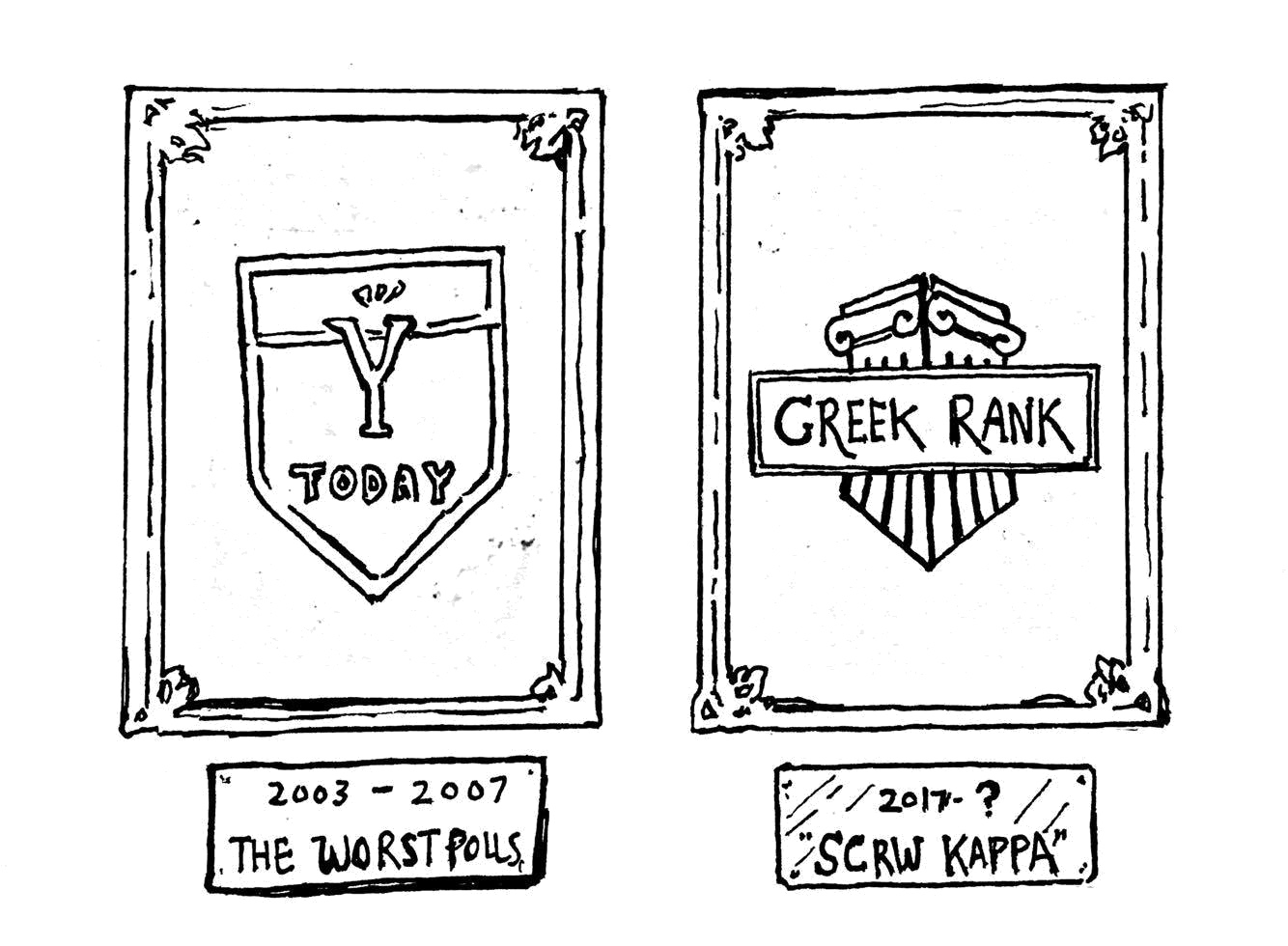
Greekrank.com, the vogue anonymous forum for comparing sororities and fraternities, fits into Yale culture as well as Woads. In the past few weeks, it’s been a tapestry for venom, with thread titles including: “APhi, STOP POSTING,” “The problem with Pi Phi,” “SCRW KAPPA” and “Theta Still has the ‘Greenwich girl’ legacy process.” No sorority has been left unscathed. Condemnations abound — there’s one post titled “sororities are all evil and you are all sellouts.” There’s another post titled — God bless this person’s heart — “Kindness.” That thread devolved within three days to comments like, “IM GOING TO STEAL THE DECLARATION OF INDEPENDENCE.”
I’m not here to criticize or defend; there’s a lot of both going on already. All I’m here to provide is a historical perspective — an argument that this stuff isn’t new. The website, to be sure, has opened up new theaters of guerilla warfare at Yale. Because of the website, it now appears normal to publish Greek life hierarchies and to question them anonymously. Now people can pretend to be part of other groups, praise those other groups and then criticize those groups for praising themselves and trying too hard. More importantly, people now have a dedicated, public place both to spread information and also to defend themselves from attacks and rumors.
But, before all this, Yalies were obsessed with another website: YaleToday. From 2003 to 2007, www.yaletoday.com was the go-to melting pot of hot gossip, party pictures, Eli’s List (“Wrapup of last weekend’s parties: good, bad and ugly”), anonymous forums and a feature called “Hot or Not?!” (where students could upload pictures of themselves and receive a rating from 1 to 10 by their peers). On March 25, 2004, there was a YaleToday poll titled “Hottest Asian Freshman Girl?” with twelve full names of students listed; in May of that year, there was a poll asking, “How overrated is DKE?” After www.yaletoday.com shuttered in 2007, there was the IvyGate blog, RumpChat, YikYak and, now, Greek Rank.
There were also pre-internet forms of public hierarchy-making at Yale. In the early 1700s, as historian Brooks Mather Kelley has shown, catalogues used to list Yale students in order based on “family position, intellectual promise and parental relationship to the college.” In the mid-1950s, anonymous Yale alums published a pamphlet titled “Inside Eli, or How to Get on at Yale,” which ranked Yale groups based on reputation. Phi Gam, for example, was “not very distinguished — most of the members being weenies,” while crew was described as a “dull, unimaginative sport.” About the Yale Daily News, the pamphlet argued that “as a college newspaper it ranks near the top, which means it is not very good, but has its bright spots.”
As with Greek Rank, no one was safe.
Sites of hierarchy-creation at Yale have risen and fallen without necessarily getting “better” or “worse” over time. Although there are more tools now — and stronger tools, too — one could argue that at least nobody on Greek Rank is asking people to name and rate the “Hottest Freshman Girl.” While YaleToday unleashed a forum for ranking specific people (much like how the early 1700s involved ranking every student), commenters on Greek Rank have to use code to reference specific people due to the site’s policies. Ultimately, what history reveals is this: People will graduate, people will forget. A new website will emerge. Maybe people on this new website will be nicer, maybe they will be meaner. Much of it will depend on the medium’s regulations and the new norms of combat.
In the end, it is a lot like trying to shuffle a deck of cards. No matter how the cards are shuffled, the deck — the system — remains. Technology has given Yalies more intricate ways of shuffling, and while hundreds of years of it doesn’t automatically justify this game of cards, perhaps the shuffling will continue until new norms and rules emerge. Maybe the wars of position will continue, pause and continue again forever and ever. Everyone, after all, has a right to fight. Still, I’d like to imagine we can invent kinder ways to battle.
Alex Zhang is a senior in Hopper College. Contact him at alexander.zhang@yale.edu







